Duff McKagan: “Whenever I play live, I play in anger and I dive in”
The Guns N' Roses man talks taking bass lessons and his new Fender signature
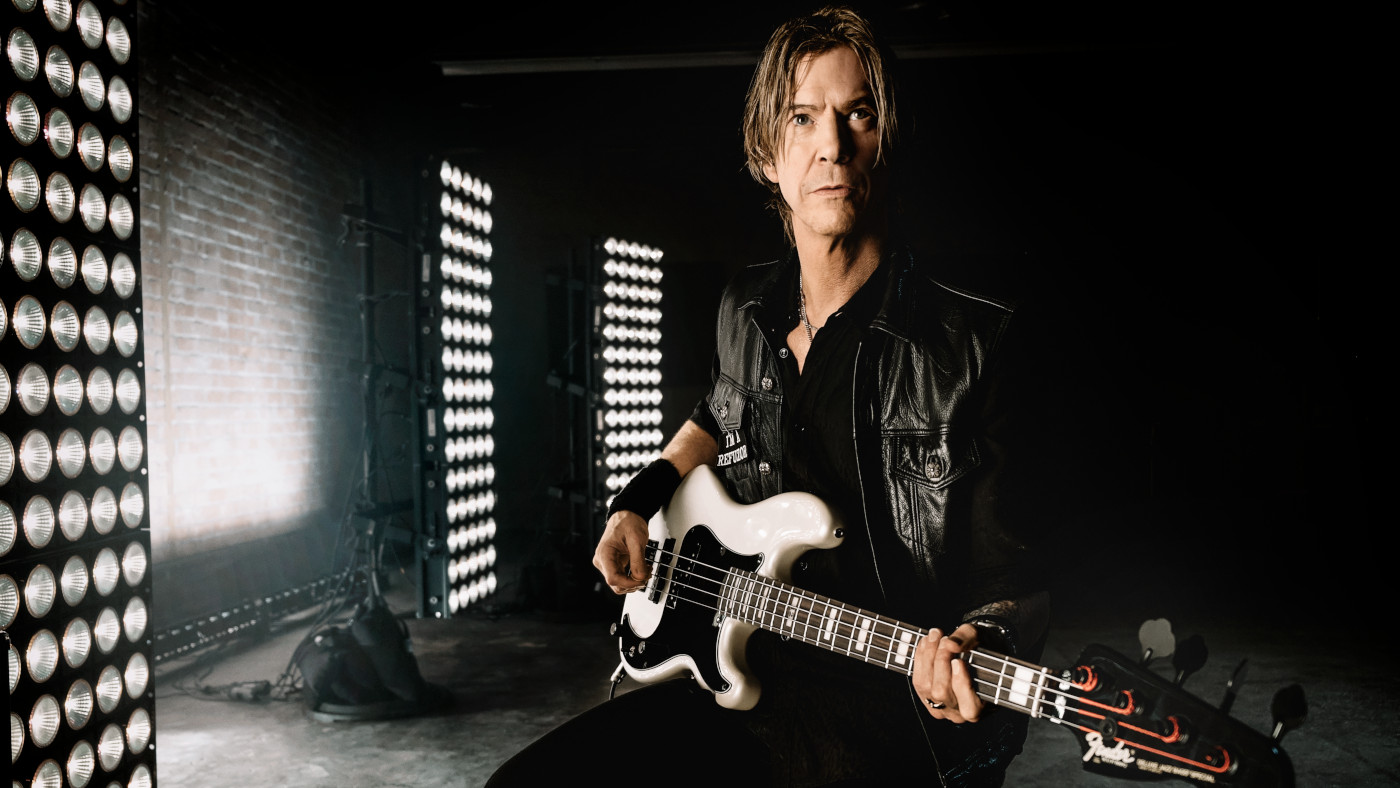
On a break from providing thunderous rumble to the biggest hard rock band ever, Guns N’ Roses bassist Duff McKagan releases a solo album, announces a new signature Fender - and addresses the perilous state of the world at the same time.
Michael McKagan, as no-one ever calls him, has seen it all, done it all and survived it all - by the slightest of margins.
The stories of his escapades as a founder member of Guns N’Roses, a band whose members practically had their humanity ground out of them by sheer fame and debauchery, are legion.
We could fill this entire article with bullet-pointed lists of the mad things that Duff did with, to and near people before 1994, when a brush with death caused him to clean up, sober up, get ridiculously fit and go on to a very productive post-GNR career.
I have daughters, and I want them to look at me like, ‘What did you do when these things happened?’
A look at his discography reveals how active he’s been over the years, whether that meant forming the much-missed supergroup Velvet Revolver, recording with Iggy Pop and the Manic Street Preachers, or working with his own bands Loaded and Walking Papers.
Read Duff’s two autobiographical books to date for the full details, but to sum up, he’s only here today because he no longer drinks 10 (yes, really) bottles of wine a day and because he survived the explosion (yes, really) of his pancreas.
The fact that he’s spent the last three years touring with the reformed Guns N’ Roses alongside singer Axl Rose and guitarist Slash, when such a thing could never have been conceived back in the bad old days, is a tribute to the man’s iron-willed recovery.
Want all the hottest music and gear news, reviews, deals, features and more, direct to your inbox? Sign up here.
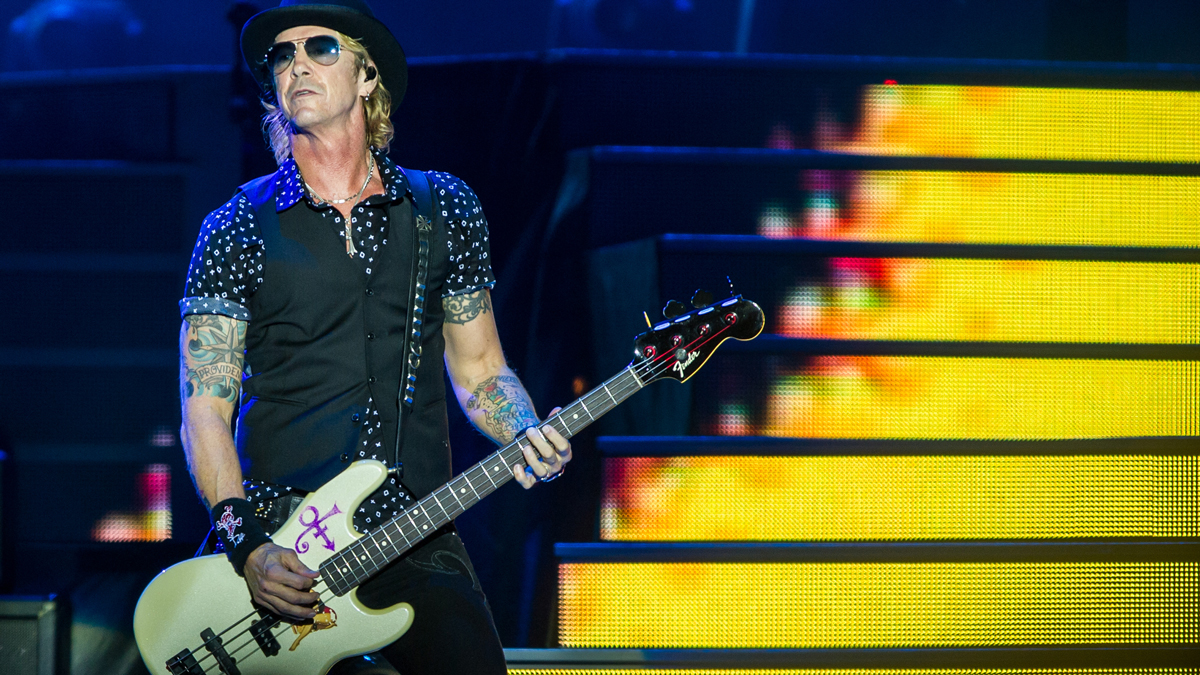
These frankly unnerving escapades seem worlds away from the 55-year-old dad, band-member and newspaper columnist who we meet today to discuss his new album and new bass.
The former, which goes by the title Tenderness, is a soulful collection of acoustic ballads, laced with plenty of tasteful bass playing; the latter is a droolworthy Fender Deluxe Precision, a P and Jazz hybrid that we’re looking forward to getting our hands on. Let’s see what’s happening in Duff’s world...
Duff, apologies for kicking off with a sensitive question, but how’s your pancreas?
“Completely healed! I’ve done other damage to my sinuses and stuff, but I try to overcome and fix and whatnot. My organs are all good, thank you for asking.”
You have 25 years sober in 2019 - that’s a hell of an achievement.
“Thank you. I wouldn’t be alive, for sure, if I hadn’t stopped drinking.”
How would you describe your new album?
“It’s a realistic record, although I tried to put some optimism in there too. I’ve read a lot of history since I got sober in 1994. I’ve informed myself about what’s gone on on this planet. I’ve been travelling for 30 years, and I like to visit places that I read about. I go and check them out, and I talk to people while I’m doing that. I wrote little vignettes, without judgment, just from my observations, which I think comes from being a columnist with the Seattle Weekly and my martial arts and my sobriety and being at ease and playing with my old band. Those became the songs, which became the record. I have daughters, and I want them to look at me like, ‘What did you do when these things happened?’ and I’m trying to say something about that.”
A new model
Your new bass is a beauty. Tell us how it came about.
“When I started playing with Walking Papers in 2012, they had recorded part of their first record in Seattle with [singer] Jeff Angell, who is a Seattle treasure and deserves international attention. I came in and played, and there were a lot of songs in drop-D tuning. I brought my Fender Special, which is my first signature model - an amazing recording bass - and I was dropping the E string down to D. One thing led to another and we went out to do a tour. At the time I was taking lessons with [legendary session bassist] Reggie Hamilton.”
We started talking about doing a cross between my Special and this bass with a Hipshot Xtender
What elements of bass playing did you work on with Reggie?
“I wanted to know more about the neck. My playing was fine: I felt comfortable, and whenever I play live I play in anger and I dive in, but I wanted to dive deeper into playing with my fingers on my right hand a bit more, and seeing what that’s all about, so I listened to Booker T & The MGs and Donald ‘Duck’ Dunn and James Jamerson and Larry Graham. I’m a huge Prince fan, too, and I wanted to know how to play like that.
“Anyway, at the end of Velvet Revolver’s last tour in the UK, Reggie sent me out a modded Geddy Lee Jazz bass. It had a Hipshot Xtender, so I grabbed that bass for the Walking Papers tour, so I could just Hipshot between those drop-D songs and songs with standard tuning without switching basses.”
And this led to an actual production model?
“Yes, we started talking about doing a cross between my Special and this bass that I was playing. Then, when Guns came back together [in 2016] I brought that bass into the arsenal, and we started chopping out what would become this new signature model. I still use my Jazz Special on all the Appetite For Destruction [1987] songs and a lot of the Use Your Illusion [1991] stuff. On a lot of the Chinese Democracy [2012] songs there’s a lot of detuning, so we brought the new bass in and I started using it a lot in our set.”
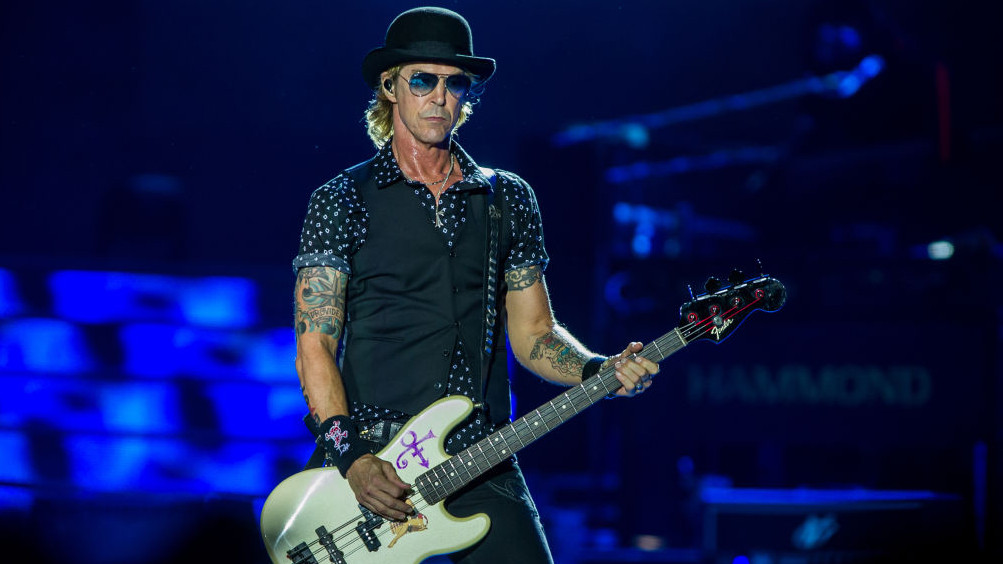
Fender bender
Have you endorsed Fender since the beginning of GNR?
“Not from the very beginning, no. At the beginning, I got my first bass at Guitar Center when we got our record advance; the Special that I’d had my eye on. I was that guy going into the guitar store all the time and not buying anything because I couldn’t afford it.”
To have two signature Fender models... you know, it’s kind of stupid, if you’re me, coming up in the punk rock scene. I’m really honoured
Like Prince in Purple Rain.
“Exactly! I’ll take that... I was that guy. They were probably getting sick of me coming in there, but one day I came in and I bought it. When we started touring on Appetite, I just had the one bass. Maybe I had a Yamaha Precision as a backup, because that was a bass I could afford and I got it for, you know, nothing. I used the white Fender on Appetite and through the tour, and McBob [aka Mike Mayhue], my tech, said ‘We gotta get another one’ so we got another Jazz Special. They took my bass and ran it through a computer and the neck was a little more egg-shaped than round, because that’s what I needed, a thin feel. They spun another neck for me like mine, so then I had two. I got more basses through the custom shop.
“I was drinking a lot and whatever then, and we were in Chicago writing songs for Illusion, and there was a NAMM Show there. We went down there... I don’t know where I was, I was drunk. I made a scene at Fender, and I think they didn’t want to have anything to do with me for a couple of years!”
Ouch.
“I’m not sure what I did, to be honest with you. Doesn’t matter. But we regained a relationship with the new squad that came in, and since Velvet Revolver started, Fender and me, we became a team. To have two signature Fender models... you know, it’s kind of stupid, if you’re me, coming up in the punk rock scene.
“I’m really honoured. They supported me through the Walking Papers thing. We were playing clubs and I was testing out a Fender head, going through Europe. Not huge exposure for their product, but they believed in me. I really appreciated that.”
So you’re still improving as a bass player?
“Yeah, I’m super into it. When Guns started that’s when I really became serious about playing bass, and then fast-forward a bunch of years to Velvet Revolver when I started taking bass lessons, I got into playing Led Zeppelin shit.
“I did a gig a while back with Kim Thayil and Jerry Cantrell. Barrett Martin [Screaming Trees/Walking Papers] played drums, and a bunch of guys sang, and we did a Led Zeppelin thing in front of Jimmy Page in Seattle.”
No pressure...
“Yeah, no pressure! We had to be fucking amazing, so everybody woodshedded on their own. I took three weeks over it, six to eight hours a day watching YouTube and trying to play exactly what John Paul Jones played. That brought me to another level of appreciation of James Jamerson and the classic Fender bass players.”
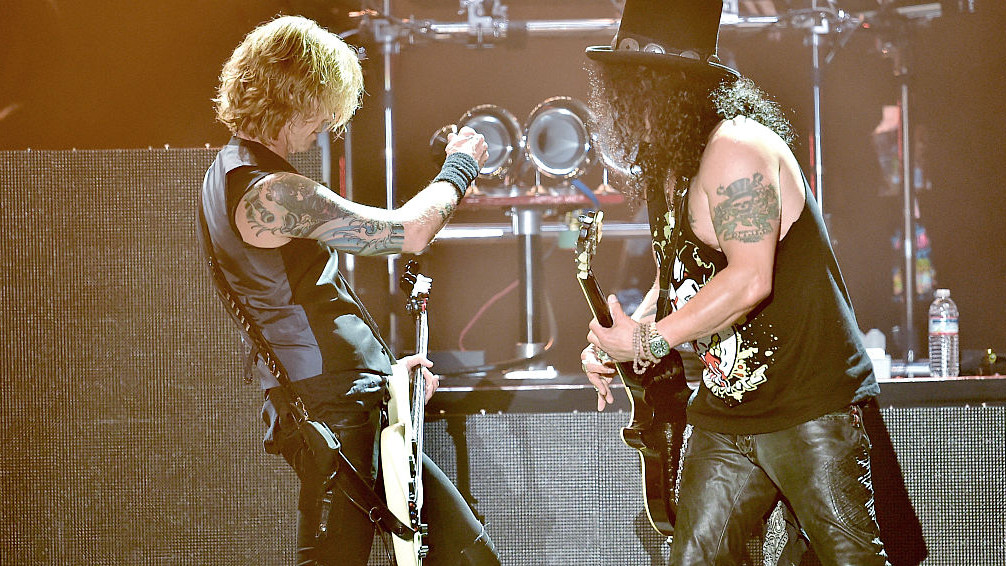
Space and bass
On the album, your bass tones are bottom-heavy with few mids - the opposite of your sound in the day-job band.
We really discovered [the importance of space] on Appetite, where Slash had his heavy guitar tones
“Ha ha, the day-job band! Yeah, it’s different. There’s space. Every song has different spaces to fill - I think as a bass player you gotta really recognise that. You don’t want to fill it up with a lot of notes. If a young bass player asks me ‘What do I need to know?’ I would say that you need to know when not to play. That’s what I’m discovering more and more. In Guns, we really discovered that on Appetite, where Slash had his heavy guitar tones; I would come in on a fill or a riff with him and then back out. Steven [Adler]’s drumming wasn’t over the top; his backbeat was a thing you could lock into, and Izzy [Stradlin, guitar] had a lot of running lines - so where did the bass fit into all that stuff? We all found our spot, and that taught me a lot.”
Faith No More opened for GNR in 1992. Did you admire Bill Gould’s bass playing?
“Of course! Yeah, yeah, yeah, and still do. Last night I went to see the original TSOL play, and Mike Roche was always a hero, and he still is a fucking hero. A really good bass player, with really cool lines that he played. I listened back in the day to Magazine, I don’t know if you remember them? And of course there was Lemmy - like, fuck! The way he attacked the bass... and Killing Joke was a big influence on me. Great rhythm section. And of course all of the Prince stuff, and Cameo and the Clash.
“We used to go watch Jane’s Addiction and see that rhythm section, and be like ‘Okay, that’s our benchmark right now’. It was a really good time to watch other bands and see how they were doing it. I had lots to draw from. It all kind of melted into one thing for me.”
Which brings us to 2019. What do you want our readers to take from your new album?
“This record is all about trying to heal. I use of lot of ‘We’ in the song lyrics, because it doesn’t matter what I think. These songs are my observations about everything from homelessness, to the Oxycontin ravages in certain parts of the USA, to the talking heads on TV that everybody watches.
“Look at history and how it repeats itself. We’re all still getting fooled by The Man; they’ve found a really good way to keep us down - by separating us. But we’re better, and smarter, than that, and my record is trying to highlight that. We’re all in this together.”
New bass, new danger
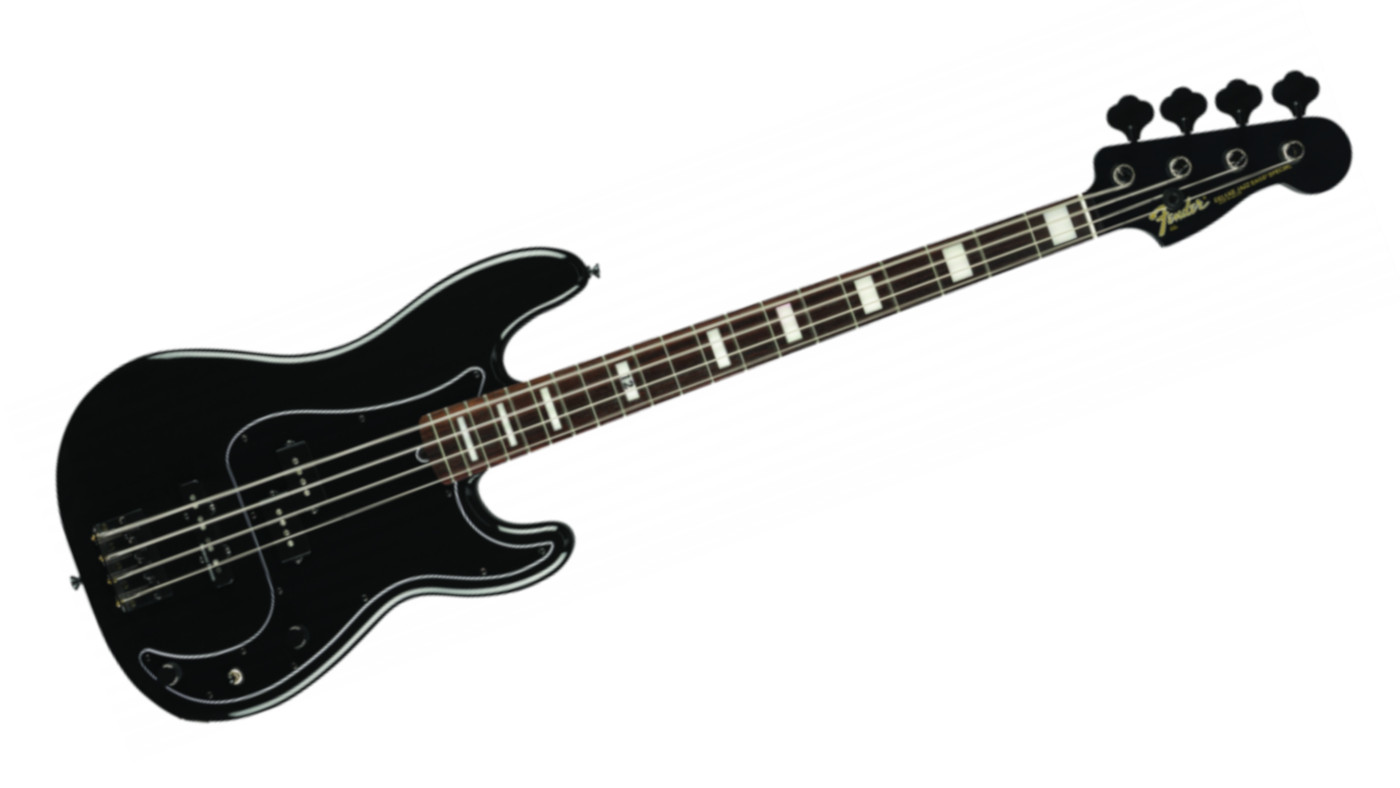
Duff McKagan’s new Deluxe
Precision bass is based on the 1980s Jazz Bass Special he used while recording Appetite For Destruction. It features a black painted ‘Modern C’- shaped quartersawn maple neck and a rosewood fingerboard with pearloid block inlays, along with the number 12 at the twelfth fret.
A Hipshot Bass Xtender allows instant drop-tuning and there are two pickups, a Fender vintage-style Precision split-coil and a Seymour Duncan STKJ2B Jazz Bass single-coil unit. It’s rounded off with a Fender TBXTM (Treble/Bass Expander) tone circuit, a Pure Vintage 70s bridge, a Duff skull and crossbones neckplate and a deluxe gigbag. It’s yours for $1,199.99.

